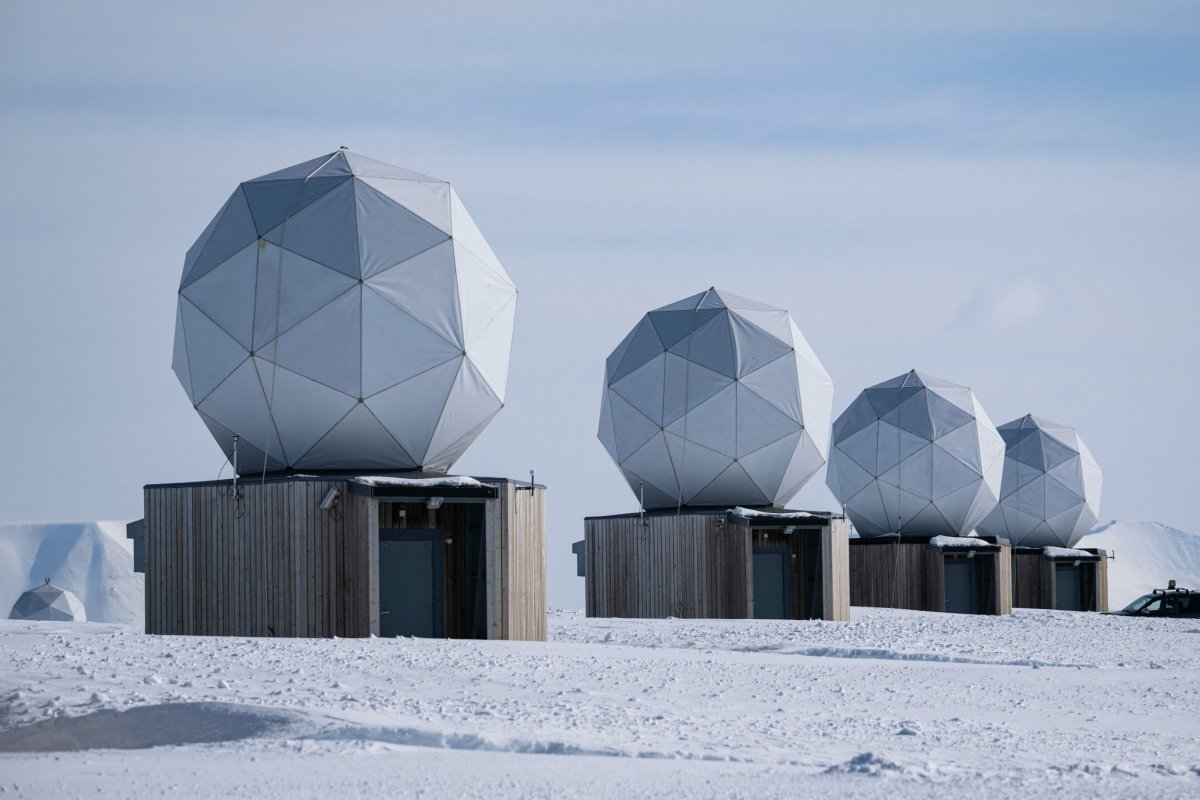U.S. lawmakers from both sides of the aisle have asked the government to do more to address scientific research by China in the territory of America’s Arctic allies that has potential military applications, Newsweek has learned.
In a letter sent on Wednesday to Secretary of State Antony Blinken and Secretary of Defense Lloyd Austin, a bipartisan congressional committee said the People’s Republic of China was seeking influence and access in the strategically important Arctic region, and that it was expanding its “dual-use”—mixed military and civilian—research, including in NATO allies Norway and Iceland, in ways that may challenge U.S. security.
Newsweek reported in July that a Chinese institute in Svalbard archipelago in the Norwegian Arctic was carrying out potential dual-use research including in the areas of radar and missile tracking, that the institute was using a name that masked its role in China’s military industry, and that it was undertaking classified research and working with the Chinese People’s Liberation Army (PLA).
“In recent years, the PRC has increased its effort to seek access to and exert influence in the Arctic, including expanding dual civil-military research efforts in the region,” says the letter sent by the House Select Committee on the Chinese Communist Party and seen exclusively by Newsweek.
“The Arctic is critical to U.S. national security interests and the defense of our homeland, and we must work with our allies to preserve our defense treaty commitments,” the committee, chaired by Reps. John Moolenaar (R-MI) and ranking member Raja Krishnamoorthi (D-IL), said.
Norway and Iceland are both NATO allies. Iceland has no standing army—the United States is responsible for its defense.
The request to act on what the committee called “problematic” research by China comes amid growing geopolitical competition between Beijing and Washington. China has said it seeks to match or outdo the U.S. and its allies in all spheres, including the economy and the military, by 2049, the centennial of the 1949 Communist revolution.
China’s embassy in Washington, D.C., did not respond to a request for comment. The Chinese government said previously that its scientific research is for peaceful purposes, and that it is a constructive player in the Arctic that seeks to promote sustainable development.

STR/AFP via Getty Images
In the letter, the committee asked Blinken and Austin to assess the national security risk to U.S. military operations posed by Chinese research in Svalbard and in Iceland, “particularly in terms of missile defense, submarine detection, and satellite tracking capabilities.”
It also asked whether the U.S. government had discussed concerns about Chinese research in the Arctic with the Norwegian, Icelandic, or Swedish governments, and what “specific steps” the U.S. and its NATO allies could take to address Chinese access to sensitive dual-use technologies and data.
“The PRC understands the strategic importance of the Arctic,” the committee said, noting China’s declaration in 2015 that the polar regions were part of China’s state security.
“Shortly thereafter, in 2018, the PRC issued its first Arctic Strategy, declaring itself a ‘near-Arctic state,'” the letter said. At its closest point, China is 900 miles from the Arctic Circle, about the distance from New York to Tallahassee.
The committee highlighted as a key concern work by the China Research Institute of Radiowave Propagation (CRIRP) on Svalbard and in nearby Nordic locations, including with a sophisticated European radar system called EISCAT. The institute is part of the China Electronics Technology Group Corporation (CETC), one of the nation’s top defense conglomerates.
State-owned CETC says it leverages civilian technology for the Chinese military. The company could not be reached for comment.

JONATHAN NACKSTRAND/AFP via Getty Images
The House committee said a joint China and Iceland Arctic observatory in northeastern Iceland “is another PRC research station that appears to perform dual-use research on the territory of our NATO allies.”
The Shanghai-based Polar Research Institute of China (PRIC) and the University of Iceland formally opened the China-Iceland Arctic Observatory in Kárhóll in Iceland in 2018—but the facility had been collecting data since 2013, according to the letter.
According to the PRIC, the observatory mainly supports research on the aurora borealis, or northern lights, as well as on the polar ionosphere and space weather. By 2023, the PRIC had invested approximately $5 million in the facility, mostly covering its expenses, the committee said.
Some Icelandic stakeholders had raised concerns over the research but no formal security review has taken place, the letter said, adding that Icelandic law lacked provisions for such national security-related reviews.
As the U.S. is responsible for Iceland‘s defense, it “should urge and assist the Icelandic government to carry out a national security review of the research performed by PRC scientists and halt any PRC research that is used for military purposes on Icelandic soil,” the lawmakers said.
The committee noted that the White House’s 2022 National Strategy for the Arctic Region and the Pentagon’s updated 2024 Arctic Strategy, published in July, had both already expressed concerns over China’s dual-use research in the Arctic.
LJ Eads, founder of the scientific research-focused analytics website Data Abyss, which is co-funded by the Pentagon, said that CRIRP was operating with “untethered access” in the Arctic and collaborating with the PLA, often leveraging dual-use research under the guise of civilian activities like ionospheric monitoring, or climate research.
“The reality is that these collaborations are not about understanding global warming or climate change. They are squarely focused on advancing military objectives—enhancing radar systems, missile guidance, and space surveillance capabilities,” Eads told Newsweek.
The Chinese Embassy in Oslo has previously said that concerns over Chinese dual-use research were “hype” and “completely unfounded.”


